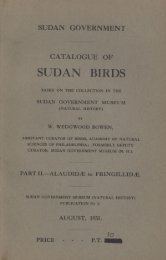- Page 3:
FONTES HISTORIAE NUBIORUM Vol. II
- Page 6 and 7:
Published with a grant from The Nor
- Page 8 and 9:
Fontes Historiae Nubiorum II 85 Ale
- Page 10 and 11:
Fontes Historiae Nubiorum II 142 De
- Page 13 and 14:
INTRODUCTION As was stated in our f
- Page 15 and 16:
Introduction We have not, however,
- Page 17 and 18:
Introduction A General Note to the
- Page 19 and 20:
Introduction inscriptions with note
- Page 21 and 22:
Introduction that exhibit differing
- Page 23:
Introduction Coptic shows us that t
- Page 26 and 27:
Fontes Historiae Nubiorum II LdÄ L
- Page 28 and 29:
Bibliographical List Fontes Histori
- Page 30 and 31:
Bleiberg 1985/86 Blumenthal 1970 Bo
- Page 32 and 33:
Davies 1991 Derchain-Urtel 1985 Des
- Page 34 and 35:
Fontes Historiae Nubiorum II Goyon
- Page 36 and 37:
Fontes Historiae Nubiorum II Hintze
- Page 38 and 39:
Junker 1958 Kaiser et al. 1982 Kapl
- Page 40 and 41:
Maehler 1970 Maehler 1992 Maehler-S
- Page 42 and 43:
Fontes Historiae Nubiorum II Ortasc
- Page 44 and 45:
Römer 1994 Russmann 1974 Sauneron-
- Page 46 and 47:
Fontes Historiae Nubiorum II Törl5
- Page 48 and 49:
Fontes Historiae Nubiorum II Verdin
- Page 50 and 51:
Fontes Historiae Nubiorum II Zauzic
- Page 52 and 53:
Rhodes 1988 de Romilly 1962 Wade-Ge
- Page 54 and 55:
Fontes Historiae Nubiorum II develo
- Page 56 and 57:
Fontes Historiae Nubiorum II Nfr-ib
- Page 58 and 59:
Fontes Historiae Nubiorum II 71 Ins
- Page 60 and 61:
Fontes Historiae Nubiorum II S3 R<
- Page 62 and 63:
Fontes Historiae Nubiorum II c3=sn
- Page 64 and 65:
Fontes Historiae Nubiorum II (37) p
- Page 66 and 67:
Fontes Historiae Nubiorum II nn rm.
- Page 68 and 69:
Fontes Historiae Nubiorum II rd.(59
- Page 70 and 71:
tbw 3 fib-vesse1: 1, (69) s 25 (69)
- Page 72 and 73:
Fontes Historiae Nubiorum II wnn hm
- Page 74 and 75:
Fontes Historiae Nubiorum II wn]n=f
- Page 76 and 77:
Fontes Historiae Nubiorum II hr st-
- Page 78 and 79:
Fontes Historiae Nubiorum II srml[r
- Page 80 and 81:
Fontes Historiae Nubiorum II proces
- Page 82 and 83:
Fontes Historiae Nubiorum II the as
- Page 84 and 85:
Fontes Historiae Nubiorum II Temple
- Page 86 and 87:
Fontes Historiae Nubiorum II the is
- Page 88 and 89:
Fontes Historiae Nubiorum II
- Page 90 and 91:
iw=f rh mi Dhwty he is wise like Th
- Page 92 and 93:
ntrw nb ntrwt nb n 0 all gods and g
- Page 94 and 95:
(76) Harsiyotef. Titles. Fontes His
- Page 96 and 97:
Fontes Historiae Nubiorum II the sa
- Page 98 and 99:
THE LEFT-HAND-SCENE Fontes Historia
- Page 100 and 101:
(7) dd=w n=i i dd (7) They spoke to
- Page 102 and 103:
Fontes Historiae Nubiorum II wn mi=
- Page 104 and 105:
Fontes Historiae Nubiorum II hn m-g
- Page 106 and 107:
hr dit-st And, behold: Fontes Histo
- Page 108 and 109:
p(3)=k ft nfr Your awesomeness is g
- Page 110 and 111:
di=1 wrd n=f I rmade him weak'. p(;
- Page 112 and 113:
Fontes Historiae Nubiorum II hn< m
- Page 114 and 115:
dt 38 (141) thk3t-1 spelt: 38 (141)
- Page 116 and 117:
Fontes Historiae Nubiorum II have b
- Page 118 and 119:
Fontes Historiae Nubiorum II In a m
- Page 120 and 121:
Fontes Historiae Nubiorum II gion (
- Page 122 and 123:
Fontes Historiae Nubiorum II Betwee
- Page 124 and 125:
Fontes Historiae Nubiorum II In fro
- Page 126 and 127:
(83) Nastaseri. Evidence for reign.
- Page 128 and 129:
Fontes Historiae Nubiorum II confro
- Page 130 and 131:
LEFT HALF TITLE OF HUMAN-HEADED AMe
- Page 132 and 133:
Fontes Historiae Nubiorum II Hr K3-
- Page 134 and 135:
dd=i w dd and I spoke them, saying
- Page 136 and 137:
ph r Pr-e; and I reached the Great
- Page 138 and 139:
til(=i) 1W32 Fontes Historiae Nubio
- Page 140 and 141:
Fontes Historiae Nubiorum II cld py
- Page 142 and 143:
it 1(3-n-n 4 honey, kurara-vessels:
- Page 144 and 145:
Fontes Historiae Nubiorum II b(=i)
- Page 146 and 147:
luy Great slaughter. {n} pi (47) w
- Page 148 and 149:
1w3 22120 (54) long-horned oxen: 22
- Page 150 and 151:
Fontes Historiae Nubiorum II iry=w
- Page 152 and 153:
hr in-lw snw r3=k r—' And if your
- Page 154 and 155:
Fontes Historiae Nubiorum II 46-67)
- Page 156 and 157:
Fontes Historiae Nubiorum II for wh
- Page 158 and 159:
Fontes Historiae Nubiorum II at Kaw
- Page 160 and 161:
Fontes Historiae Nubiorum II Text T
- Page 162 and 163:
Fontes Historiae Nubiorum II its he
- Page 164 and 165:
AO)A0110.3AX1 10dWOS-.) 1D)L 01A(10
- Page 166 and 167:
Fontes Historiae Nubiorum II whites
- Page 168 and 169:
Fontes Historiae Nubiorum II the gr
- Page 170 and 171: 2. 3. Fontes Historiae Nubiorum II
- Page 172 and 173: Fontes Historiae Nubiorum II Hr (2)
- Page 174 and 175: Fontes Historiae Nubiorum II Burton
- Page 176 and 177: .mocto»rionoDodu noddpixi 53A1.1.
- Page 178 and 179: Fontes Historiae Nubiorum II Commen
- Page 180 and 181: Fontes Historiae Nubiorum II (90) A
- Page 182 and 183: Fontes Historiae Nubiorum II nh wd3
- Page 184 and 185: Fontes Historiae Nubiorum II (10) r
- Page 186 and 187: Fontes Historiae Nubiorum II The te
- Page 188 and 189: Fontes Historiae Nubiorum II mtw=k
- Page 190 and 191: Fontes Historiae Nubiorum II Note t
- Page 192 and 193: Fontes Historiae Nubiorum II Commen
- Page 194 and 195: Fontes Historiae Nubiorum II The st
- Page 196 and 197: Fontes Historiae Nubiorum II time h
- Page 198 and 199: Fontes Historiae Nubiorum II 99 Buh
- Page 200 and 201: Fontes Historiae Nubiorum II says 6
- Page 202 and 203: Fontes Historiae Nubiorum II flecte
- Page 204 and 205: Fontes Historiae Nubiorum II 103 On
- Page 206 and 207: Fontes Historiae Nubiorum II Introd
- Page 208 and 209: Fontes Historiae Nubiorum II Commen
- Page 210 and 211: Fontes Historiae Nubiorum II cal in
- Page 212 and 213: Fontes Historiae Nubiorum II Noa, G
- Page 214 and 215: Ariae (?) or Fontes Historiae Nubio
- Page 216 and 217: Fontes Historiae Nubiorum II Romm 1
- Page 218 and 219: Fontes Historiae Nubiorum II Transl
- Page 222 and 223: Fontes Historiae Nubiorum II is cor
- Page 224 and 225: Fontes Historiae Nubiorum II in the
- Page 226 and 227: Fontes Historiae Nubiorum II (115)
- Page 228 and 229: Fontes Historiae Nubiorum II Transl
- Page 230 and 231: Comments Fontes Historiae Nubiorum
- Page 232 and 233: Fontes Historiae NubiorumIl j.té24
- Page 234 and 235: Fontes Historiae Nubiorum II We fol
- Page 236 and 237: Text Fontes Historiae Nubiorum II 8
- Page 238 and 239: Fontes Historiae Nubiorum II Megaba
- Page 240 and 241: Fontes Historiae Nubiorum II sawwar
- Page 242 and 243: Fontes Historiae Nubiorum II nb hsw
- Page 244 and 245: Fontes Historiae Nubiorum II the or
- Page 246 and 247: Fontes Historiae Nubiorum II lary.
- Page 248 and 249: Fontes Historiae Nubiorum II tional
- Page 250 and 251: Fontes Historiae Nubiorum II 132 Fr
- Page 252 and 253: Fontes Historiae Nubiorum II BEHIND
- Page 254 and 255: Fontes Historiae Nubiorum II temple
- Page 256 and 257: tb3(4) p3 wdy (n) m irpyw about (4)
- Page 258 and 259: Fontes Historiae Nubiorum II Nubian
- Page 260 and 261: mr nsw 1— ... —1 the beloved of
- Page 262 and 263: Fontes Historiae Nubiorum II hn wn
- Page 264 and 265: Fontes Historiae Nubiorum II this r
- Page 266 and 267: Fontes Historiae Nubiorum II hnsert
- Page 268 and 269: Fontes Historiae Nubiorum II hrt rd
- Page 270 and 271:
Fontes Historiae Nubiorum II pected
- Page 272 and 273:
Fontes Historiae Nubiorum II Commen
- Page 274 and 275:
Fontes Historiae Nubiorum II Stp-n-
- Page 276 and 277:
Fontes Historiae Nubiorum II (2) hr
- Page 278 and 279:
Fontes Historiae Nubiorum II (3) pr
- Page 280 and 281:
Fontes Historiae Nubiorum H THE NAM
- Page 282 and 283:
Fontes Historiae Nubiorum II (2) r
- Page 284 and 285:
Fontes Historiae Nubiorum II 3bw hr
- Page 286 and 287:
Fontes Historiae Nubiorum II (1) ii
- Page 288 and 289:
Fontes Historiae Nubiorum II missin
- Page 290 and 291:
Fontes Historiae Nubiorum II the ba
- Page 292 and 293:
Fontes Historiae Nubiorum Il who wa
- Page 294 and 295:
Fontes Historiae Nubiorum II of sup
- Page 296 and 297:
Fontes Historiae Nubiorum II the ne
- Page 298 and 299:
Fontes Historiae Nubiorum II been s
- Page 300 and 301:
.5101C9J., 'A134pdk 134312113)1 Agc
- Page 302 and 303:
Fontes Historiae Nubiorum II Tdi.;
- Page 304 and 305:
Fontes Historiae Nubiorum II what i
- Page 306 and 307:
Comments Fontes Historiae Nubiorum
- Page 308 and 309:
Fontes Historiae Nubiorum II tifica
- Page 310 and 311:
Fontes Historiae Nubiorum II Tot; '
- Page 312 and 313:
Fontes Historiae Nubiorum II the me
- Page 314 and 315:
Fontes Historiae Nubiorum II the re
- Page 316 and 317:
Fontes Historiae Nubiorum II Katepy
- Page 318 and 319:
Fontes Historiae Nubiorum II xoScra
- Page 320 and 321:
Fontes Historiae Nubiorum II actual
- Page 322 and 323:
Fontes Historiae Nubiorum II name m
- Page 324 and 325:
Fontes Historiae Nubiorum II gore m
- Page 326 and 327:
Fontes Historiae Nubiorum II (141)
- Page 328 and 329:
Fontes Historiae Nubiorum II kdi=wo
- Page 330 and 331:
Fontes Historiae Nubiorum II of the
- Page 332 and 333:
Fontes Historiae Nubiorum II they a
- Page 334 and 335:
Fontes Historiae Nubiorum II (26)ah
- Page 336 and 337:
Fontes Historiae Nubiorum II Commen
- Page 338 and 339:
Fontes Historiae Nubiorum II Instea
- Page 340 and 341:
Fontes Historiae Nubiorum II (20) a
- Page 342 and 343:
Fontes Historiae Nubiorum II Empero
- Page 344 and 345:
Fontes Historiae Nubiorum II King H
- Page 346 and 347:
Fontes Historiae Nubiorum II (1) lp
- Page 348 and 349:
Fontes Historiae Nubiorum II Treu 1
- Page 350 and 351:
Fontes Historiae Nubiorum II presen
- Page 352 and 353:
Fontes Historiae Nubiorum II any in
- Page 354 and 355:
Fontes Historiae Nubiorum II 165 Co
- Page 356 and 357:
Fontes Historiae Nubiorum II (4) Cl
- Page 358 and 359:
Fontes Historiae Nubiorum II photog
- Page 360 and 361:
Fontes Historiae Nubiorum II phy: W
- Page 362 and 363:
Fontes Historiae Nubiorum II poses
- Page 364 and 365:
Text Fontes Historiae Nubiorum II 1
- Page 366 and 367:
Fontes Historiae Nubiorum II Transl
- Page 368 and 369:
Fontes Historiae Nubiorum II We giv
- Page 370 and 371:
Fontes Historiae Nubiorum II We rep
- Page 372 and 373:
Text Fontes Historiae Nubiorum II '
- Page 374 and 375:
Fontes Historiae Nubiorum II the W
- Page 376 and 377:
Fontes Historiae NubiorumII wards t
- Page 378 and 379:
Fontes Historiae Nubiorum II pqr„
- Page 380 and 381:
Fontes Historiae Nubiorum II The te
- Page 382 and 383:
Fontes Historiae Nubiorum II The pr
- Page 384 and 385:
Fontes Historiae Nubiorum II togeth
- Page 386 and 387:
Fontes Historiae Nubiorum II and it
- Page 388 and 389:
Fontes Historiae Nubiorum II Griffi
- Page 390 and 391:
Fontes Historiae Nubiorum 1.1 182 P
- Page 392 and 393:
Fontes Historiae Nubiorum II n fl m
- Page 394 and 395:
Fontes Historiae Nubiorum II rshl P
- Page 396 and 397:
Fontes Historiae Nubiorum II Wn-nfr
- Page 398 and 399:
Fontes Historiae Nubiorum II 209 Se
- Page 400 and 401:
Fontes Historiae Nubiorum Il 258 Jo
- Page 402 and 403:
Fontes Historiae Nubiorum II 306 Ph


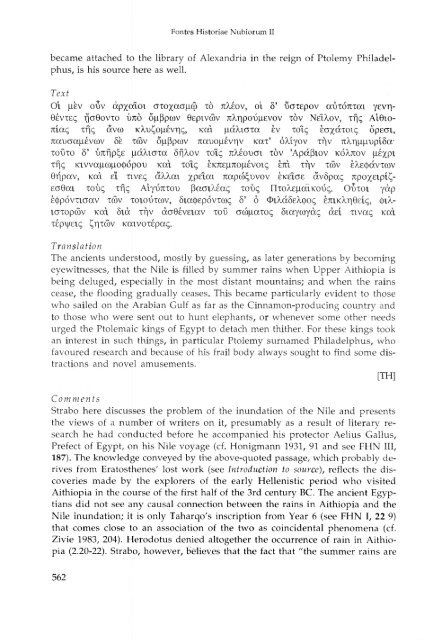
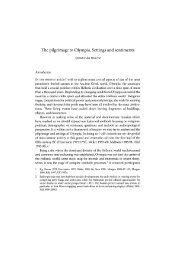



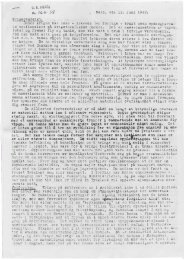


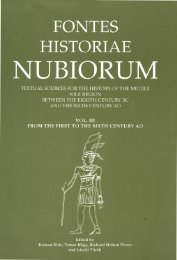

![AdyfJa'ta (ivavnvt]; yJ..mntxt]; arto 'tO Mrto(itgxo Avxatov](https://img.yumpu.com/46821018/1/185x260/adyfjata-ivavnvt-yjmntxt-arto-to-mrtoitgxo-avxatov.jpg?quality=85)
